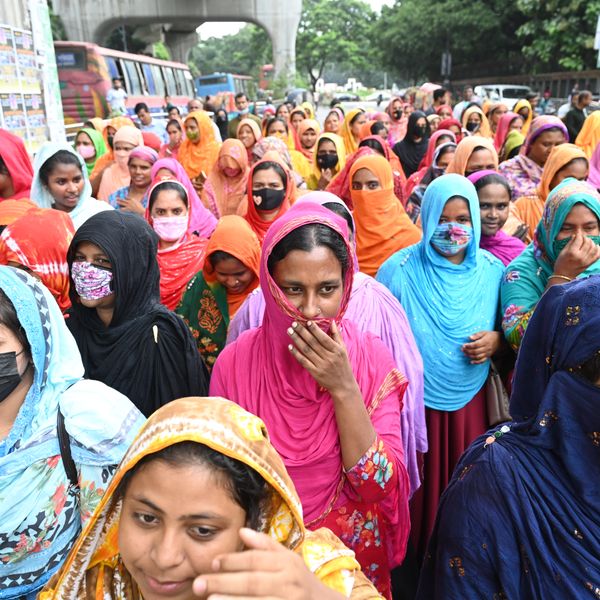Worker Advocate: Nation's Biggest Industry Fostering Low Wage, Low Benefit Workplace
Saru Jayaraman: Food industry 'proliferating lowest paying jobs with the least benefits, least amount of paid sick days'
The nation's biggest industry is fostering a low-wage, low-benefit workplace, charges restaurant worker advocate Saru Jayaraman.
Co-founder and co-executive director of Restaurant Opportunities Centers (ROC) United and author of the bestselling Behind The Kitchen Door Jayaraman appeared on Up with Chris Hayes on Saturday and brought to light some of conditions that leave food industry workers forced to work sick and rely on food stamps.
Jayaraman said, "You've got the largest industry in America basically proliferating the lowest paying jobs with the least benefits," and added that "it also is the industry with the least amount of paid sick days, so the workers in this industry don't have a way to get paid when they're sick, which means two-thirds of them report cooking, preparing and serving food when they're ill."
Urging the need for some guaranteed minimum wage to provide a livable standard, Jayaraman remarked: "Right now, food service workers use food stamps at double the rate of the rest of the U.S. workforce and suffer poverty rate of three times the rest of the workforce."
The minimum wage for tipped employees is $2.13, a rate, Jayaraman noted, that has been at this level for 22 years.
Jayaraman was joined on the panel with chef Tom Colicchio, Andrew Moesel, spokesperson for the New York State Restaurant Association, and Victoria Bruton, restaurant worker and member of Restaurant Opportunities Centers.
Visit NBCNews.com for breaking news, world news, and news about the economy
Visit NBCNews.com for breaking news, world news, and news about the economy
What can the average diner do about the working conditions of the people who brought them their food? Jayaraman said in a recent appearance on Moyers & Company, "If consumers asked, every time they ate out, or said to the management, 'Love the food, love the service, I would love to see you provide paid sick days, as a consumer that's important to me,' or 'I would love to see you do better on your wages, not pay $2.13,' just before leaving, we feel like that could make a tremendous difference in moving the industry."
________________________________
An Urgent Message From Our Co-Founder
Dear Common Dreams reader, The U.S. is on a fast track to authoritarianism like nothing I've ever seen. Meanwhile, corporate news outlets are utterly capitulating to Trump, twisting their coverage to avoid drawing his ire while lining up to stuff cash in his pockets. That's why I believe that Common Dreams is doing the best and most consequential reporting that we've ever done. Our small but mighty team is a progressive reporting powerhouse, covering the news every day that the corporate media never will. Our mission has always been simple: To inform. To inspire. And to ignite change for the common good. Now here's the key piece that I want all our readers to understand: None of this would be possible without your financial support. That's not just some fundraising cliche. It's the absolute and literal truth. We don't accept corporate advertising and never will. We don't have a paywall because we don't think people should be blocked from critical news based on their ability to pay. Everything we do is funded by the donations of readers like you. Will you donate now to help power the nonprofit, independent reporting of Common Dreams? Thank you for being a vital member of our community. Together, we can keep independent journalism alive when it’s needed most. - Craig Brown, Co-founder |
The nation's biggest industry is fostering a low-wage, low-benefit workplace, charges restaurant worker advocate Saru Jayaraman.
Co-founder and co-executive director of Restaurant Opportunities Centers (ROC) United and author of the bestselling Behind The Kitchen Door Jayaraman appeared on Up with Chris Hayes on Saturday and brought to light some of conditions that leave food industry workers forced to work sick and rely on food stamps.
Jayaraman said, "You've got the largest industry in America basically proliferating the lowest paying jobs with the least benefits," and added that "it also is the industry with the least amount of paid sick days, so the workers in this industry don't have a way to get paid when they're sick, which means two-thirds of them report cooking, preparing and serving food when they're ill."
Urging the need for some guaranteed minimum wage to provide a livable standard, Jayaraman remarked: "Right now, food service workers use food stamps at double the rate of the rest of the U.S. workforce and suffer poverty rate of three times the rest of the workforce."
The minimum wage for tipped employees is $2.13, a rate, Jayaraman noted, that has been at this level for 22 years.
Jayaraman was joined on the panel with chef Tom Colicchio, Andrew Moesel, spokesperson for the New York State Restaurant Association, and Victoria Bruton, restaurant worker and member of Restaurant Opportunities Centers.
Visit NBCNews.com for breaking news, world news, and news about the economy
Visit NBCNews.com for breaking news, world news, and news about the economy
What can the average diner do about the working conditions of the people who brought them their food? Jayaraman said in a recent appearance on Moyers & Company, "If consumers asked, every time they ate out, or said to the management, 'Love the food, love the service, I would love to see you provide paid sick days, as a consumer that's important to me,' or 'I would love to see you do better on your wages, not pay $2.13,' just before leaving, we feel like that could make a tremendous difference in moving the industry."
________________________________
The nation's biggest industry is fostering a low-wage, low-benefit workplace, charges restaurant worker advocate Saru Jayaraman.
Co-founder and co-executive director of Restaurant Opportunities Centers (ROC) United and author of the bestselling Behind The Kitchen Door Jayaraman appeared on Up with Chris Hayes on Saturday and brought to light some of conditions that leave food industry workers forced to work sick and rely on food stamps.
Jayaraman said, "You've got the largest industry in America basically proliferating the lowest paying jobs with the least benefits," and added that "it also is the industry with the least amount of paid sick days, so the workers in this industry don't have a way to get paid when they're sick, which means two-thirds of them report cooking, preparing and serving food when they're ill."
Urging the need for some guaranteed minimum wage to provide a livable standard, Jayaraman remarked: "Right now, food service workers use food stamps at double the rate of the rest of the U.S. workforce and suffer poverty rate of three times the rest of the workforce."
The minimum wage for tipped employees is $2.13, a rate, Jayaraman noted, that has been at this level for 22 years.
Jayaraman was joined on the panel with chef Tom Colicchio, Andrew Moesel, spokesperson for the New York State Restaurant Association, and Victoria Bruton, restaurant worker and member of Restaurant Opportunities Centers.
Visit NBCNews.com for breaking news, world news, and news about the economy
Visit NBCNews.com for breaking news, world news, and news about the economy
What can the average diner do about the working conditions of the people who brought them their food? Jayaraman said in a recent appearance on Moyers & Company, "If consumers asked, every time they ate out, or said to the management, 'Love the food, love the service, I would love to see you provide paid sick days, as a consumer that's important to me,' or 'I would love to see you do better on your wages, not pay $2.13,' just before leaving, we feel like that could make a tremendous difference in moving the industry."
________________________________

